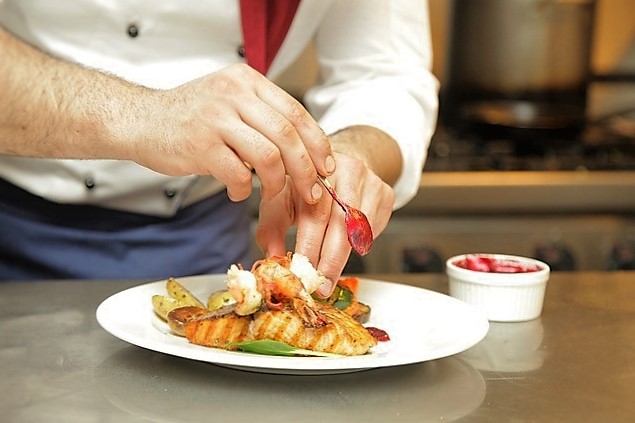Hello friends, we will remember the 15th anniversary of 9/11 in a few days. The events of that day changed the world forever and the ripple effects are still being felt around the globe today. As a World Trade Center survivor, this time of year brings about great reflection and I’m sure it does for many people who were affected directly or indirectly by this national tragedy. Moving on from major catastrophes that have entered our lives is never an easy thing. But, with proper guidance, love, assistance and the sheer desire to overcome with all your might, it can be done.
When I received an email from Michelle Peterson of Recovery Pride out of Anaheim, California, I was humbled and happy. This rehabilitation center is doing some fantastic things and they wanted me to share an article of theirs about Post Traumatic Stress Disorder (PTSD). They are familiar with my work on therapeutic cooking and wanted to partner up and share their insights on my website. The beauty of this collaboration is that Recovery Pride is a great proponent of using cooking as one of the methods to combat PTSD. And, BINGO I am a great advocate of this method too, as many of you know! Therapeutic cooking has helped me recover from various downfalls in my life, including 9/11. For the last 10 years I’ve been encouraging others who are suffering from moments of difficulty to do the same. The article below is fantastic and full of helpful information. So take your time and give it a good read. And, if you or someone you know is suffering in any way from a life that has become unmanageable, please pass on this information to them. It could be a first step in the right direction.
PTSD, or Post Traumatic Stress Disorder, affects nearly 8 million Americans at some point over the course of their lives, and because it has various root causes, it also has many different methods of treatment. From talk therapy to cognitive behavioral therapy to art therapy or service dogs, treatment must be chosen based on the individual and his or her needs. Medication is one option, but for some, a combination of meds and counseling is the best choice.
PTSD can affect anyone, at any time, at any age. It occurs after a stressful event, such as witnessing violence, being the victim of abuse, or living/working in a stressful environment, such as active military combat. It can also occur after an accident or terrorist event. Because there are so many different factors where PTSD is involved–the scene of the event, the people involved, and the severity of the trauma, for instance–there are several things that can trigger post-traumatic stress. A particular scent can bring on painful flashbacks; driving past a certain location can lead to a severe loss of sleep or nightmares. The important thing for sufferers to remember is that there is no place for guilt or shame with PTSD. Moving past what happened and down a healthier path means letting go of those negative feelings associated with the event.
For this reason, creative therapy has had wonderful success where sufferers of PTSD are concerned. Not just painting and collaging, creative therapy encompasses a wide variety of endeavors that can help people living with PTSD, mental and mood disorders, and substance abuse disorders heal and find peace. Cooking is one such option, and it holds so many positive benefits that many sufferers are encouraged to pursue culinary education.
Not only does cooking therapy help sufferers of PTSD find a healthy relationship with food, it teaches them to plan meals, plant and tend a garden, and learn how to interact in professional restaurant environments. Because food is often regarded as a comfort–either because good memories are associated with the food itself or because many people associate sitting down to a good meal with happiness–those living with PTSD can find it therapeutic to organize a meal and prepare it themselves.
Culinary therapy benifits include:
- Improved social skills
- Ability to make better, healthier choices
- Organizational skills
- Ability to focus on something positive
- Raising self-esteem
One popular technique employed by therapists is mindfulness therapy. This can be achieved in a number of ways–the most well-known being yoga and meditation–and cooking or baking is included. Because PTSD involves learning how to control thought processes, being mindful of our feelings, thoughts, and actions can greatly improve the ability to suss out negative threads and figure out what causes them. Cooking is a great way to practice this because it involves concentration and focus.
“Mindfulness-based stress reduction teaches individuals to attend to the present moment, to attend to what they are experiencing — their thoughts, their feelings — in a nonjudgmental, accepting manner. We think that teaching people these mindfulness skills helps them to have a different relationship with their PTSD symptoms — a willingness to let thoughts be there without trying to push them away,” says psychiatrist Melissa Polusny.
Because a vast majority of PTSD sufferers are military veterans, it’s important for loved ones to be supportive with various types of therapy; no two people will react to one method the same way. Also, a key point to keep in mind is that a number of veterans who suffer from PTSD also live with a substance abuse disorder, which must be treated separately.
Written by: Michelle Peterson has been in recovery for several years. She started RecoveryPride.org to help eliminate the stigma placed on those who struggle with addiction. The site emphasizes that the journey to sobriety should not be one of shame but of pride and offers stories, victories, and other information to give hope and help to those in recovery.

